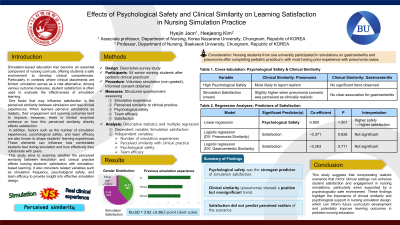Education
(63) Effects of Psychological Safety and Clinical Similarity on Learning Satisfaction in Nursing Simulation Practice
Thursday, June 19, 2025
5:00 PM - 6:30 PM MST
Location: Exhibit Hall


Hyejin Jeon, PhD
Associate professor
Korea Nazarene University
Chonan Si, Ch'ungch'ong-namdo, Republic of Korea- HK
Heejeong Kim, PhD
Professor
Baekseok University
chonan si, Ch'ungch'ong-namdo, Republic of Korea
Lead Author(s)
Co-Author(s)
Abstract: This study evaluates the impact of simulation practice focused on nursing care for children with respiratory diseases on satisfaction and perceived realism among senior nursing students. Conducted with 54 fourth-year nursing students, the simulation focused on pediatric pneumonia care to analyze key variables affecting learning satisfaction, including frequency of simulation experience, clinical similarity, psychological safety, and team efficacy. Descriptive and regression analyses were used to examine the relationships between these variables and simulation satisfaction.
Results showed that psychological safety positively correlated with simulation satisfaction (β = 0.386, p = 0.069), indicating a borderline significant effect. Additionally, perceived clinical similarity in pneumonia care demonstrated a weak positive correlation with satisfaction (r = 0.220), suggesting that the more closely the simulation aligned with real clinical experiences, the greater the learning satisfaction. However, other factors such as team efficacy and frequency of prior simulation exposure showed limited influence on overall satisfaction, underscoring the unique importance of psychological safety and relevance in educational outcomes.
This study suggests that incorporating realistic scenarios that mirror clinical settings can enhance student satisfaction and engagement in nursing simulations, particularly when supported by a psychologically safe environment. These findings highlight the importance of clinical similarity and psychological support in nursing simulation design, which can inform future curriculum development and potentially improve learning outcomes in pediatric nursing education.
Keywords: nursing simulation, pediatric respiratory care, clinical similarity, psychological safety, learning satisfaction
Please include a short summary of your presentation that highlights why an attendee would want to view your poster.: Explore how clinical realism and psychological safety impact learning satisfaction in pediatric respiratory nursing simulations. This poster presents key findings on how aligning simulation with real-world clinical experiences can enhance student engagement and satisfaction. Ideal for educators and healthcare professionals aiming to improve simulation-based learning outcomes.
Results showed that psychological safety positively correlated with simulation satisfaction (β = 0.386, p = 0.069), indicating a borderline significant effect. Additionally, perceived clinical similarity in pneumonia care demonstrated a weak positive correlation with satisfaction (r = 0.220), suggesting that the more closely the simulation aligned with real clinical experiences, the greater the learning satisfaction. However, other factors such as team efficacy and frequency of prior simulation exposure showed limited influence on overall satisfaction, underscoring the unique importance of psychological safety and relevance in educational outcomes.
This study suggests that incorporating realistic scenarios that mirror clinical settings can enhance student satisfaction and engagement in nursing simulations, particularly when supported by a psychologically safe environment. These findings highlight the importance of clinical similarity and psychological support in nursing simulation design, which can inform future curriculum development and potentially improve learning outcomes in pediatric nursing education.
Keywords: nursing simulation, pediatric respiratory care, clinical similarity, psychological safety, learning satisfaction
Please include a short summary of your presentation that highlights why an attendee would want to view your poster.: Explore how clinical realism and psychological safety impact learning satisfaction in pediatric respiratory nursing simulations. This poster presents key findings on how aligning simulation with real-world clinical experiences can enhance student engagement and satisfaction. Ideal for educators and healthcare professionals aiming to improve simulation-based learning outcomes.
Learning Objectives:
- Upon completion, participants will be able to describe the impact of clinical similarity on nursing students' satisfaction in simulation-based learning.
- Upon completion, participants will be able to identify key factors, including psychological safety, that influence learning outcomes in pediatric nursing simulations.
- Upon completion, participants will be able to utilize principles of clinical realism and psychological support to enhance engagement and satisfaction in nursing simulation scenarios.
